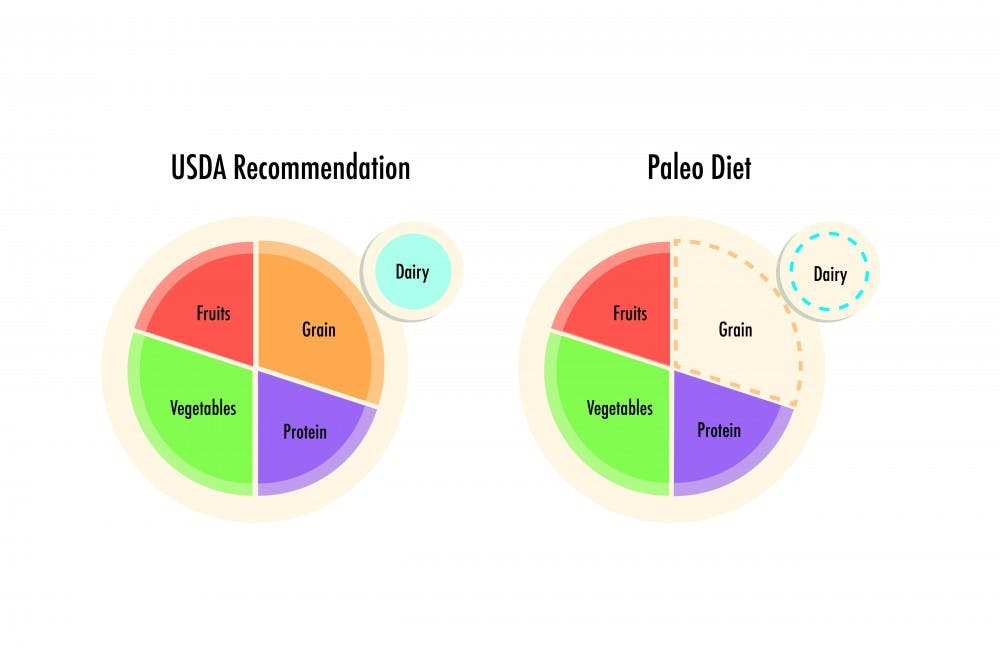“Nutrition and Diabetes,” a recent long-term study published in Nature journal, has found the Paleo Diet may be doing more harm than good. A mouse study performed at the University of Melbourne revealed a diet low in carbohydrates and high in healthy fats can result in weight gain, and a host of other problems, due to the absence of certain nutrients.
For most people following the Paleo diet, their consumption is defined less by what they eat and more by what they do not eat. Most do not eat dairy or processed grains of any kind because the Paleo diet prohibits any kind of food unavailable to Stone Age hunter–gatherers, some of which are extremely nutritious: dairy is rich in calcium, grains contain fiber and legumes are a great meatless source of protein.
For those on the Paleo diet, lean meats, fish and eggs as essential for protein. Large quantities of fruits, vegetables, nuts and seeds provide important nutrients, along with healthy fats and oils such as olive, avocado, coconut, macadamia, walnut and flaxseed.
“One of the big challenges with the Paleo diet, if you follow it strictly, is that it doesn’t allow for healthy carbohydrates like whole grains,” Angela Hasemann, RDN and co-director of Clinical Nutrition in the University Health System, said.
These and other complex carbohydrates are important for overall health and primary sources of vitamins and minerals. Restricting them can leave out some important nutrients.
Dairy is also crucial because it packs many vitamins and minerals within relatively few calories.
“The USDA has identified four nutrients of concern, three of which can be found in milk,” Hasemann said. “They are calcium, Vitamin D, a primary source of these in our diet coming from dairy products. They are fortified in some other foods but not in very large amounts typically. The third one is phosphorus, which is also available in dairy.”
Dairy substitutes such as almond and soy milk for those who are lactose intolerant or vegan have similar nutrients as cow’s milk. Plain, fat-free soy milk does not have a ton of flavor, and people will tend to buy the double chocolate full fat soy milk and other options that appear healthy but actually are not.
“Science has come a long way, too,” Hasemann said. “When you can get a glass of almond milk for only 40 calories, it’s pretty amazing. It also means it’s not going to have the same amount of nutrients as a glass of skim milk. A lot depends on what your goal is for nutrition.”
Many people are still drawn to fad diets for various reasons. These diets are easy, and unfortunately many people cannot devote the time and attention it takes to maintain a healthy diet. Some people will do whatever is necessary to change or improve their appearance, but can't seem to find the motivation to become healthier.
The psychological implications of this are salient, and have been elucidated by the research of Hugh Kelley Psychology Prof. Joseph Allen. Allen also heads The Virginia Adolescent Research Group, which studies the psychological and social development of adolescents and young adults.
“Appearance is immediate — it affects how you see yourself and others see you tomorrow,” Allen said in an email. “For young people, health is often a far more distant concern. … The greatest effects of lack of exercise, for example, aren’t likely to show up for years.”
Allen found peer pressure can also have an affect on food choices, and influences overall health.
“Teens, like all humans, are social animals and are highly influenced by those around them,” Allen said. “Everyone wants to fit in, and food can just be one more way to do that.”
The Paleo diets, among others, have not stood the test of time. Balance and moderation are crucial for any sustainable diet, along with food group variety, and restricting certain foods can make it difficult to remain consistent with any diet.







